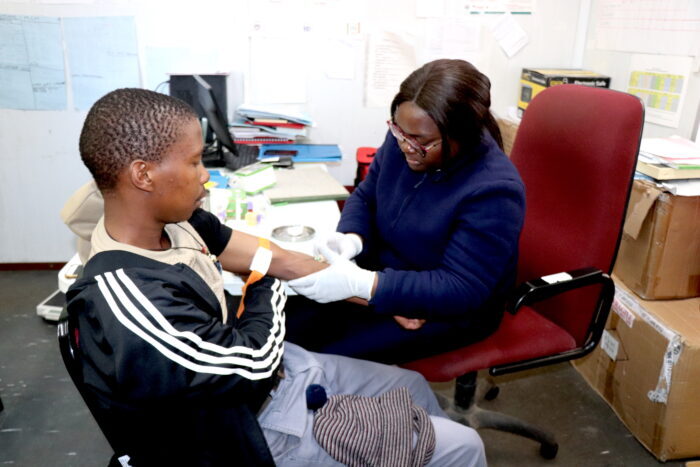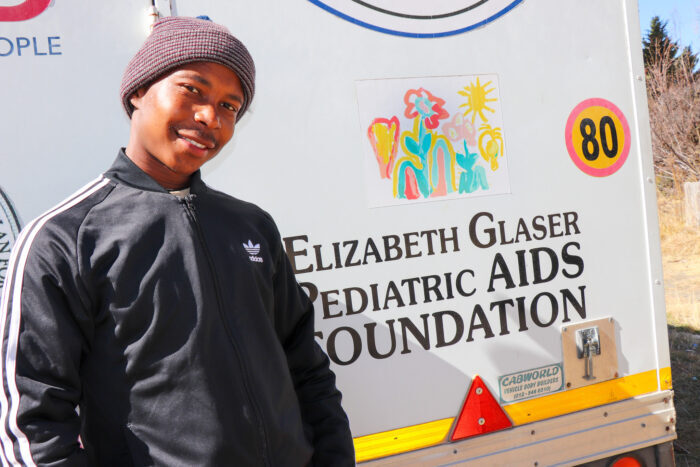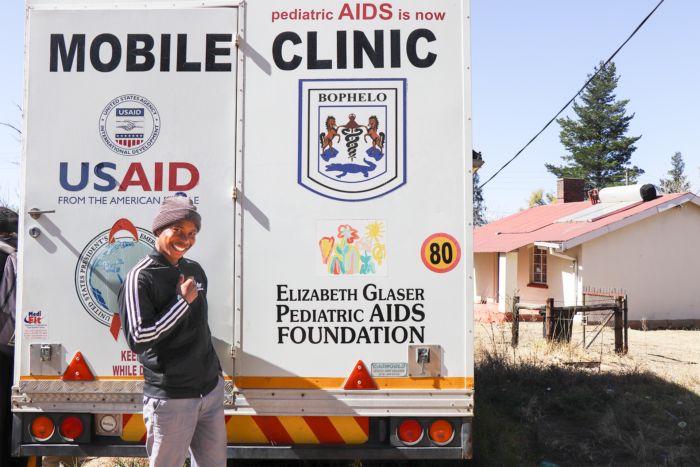Lebohang Khaahloe is a normal 23-year-old from the northern Berea district of Lesotho, the lowlands close to South Africa. He loves listening to hip-hop and Amapiano (a style of house music that originated in South Africa), and he even produces his own beats. He is an active member of Taekwondo team at university. Lebohang loves sports because it motivates him—especially when he wins. He feels like a hero who can defeat any obstacles that he meets in life.
Lebohang discovered that he is HIV-positive at the age of 9, when he became extremely ill, and his mother took him to a doctor to be tested. He was immediately enrolled in antiretroviral treatment (ART). As the last-born, with two older sisters, Lebohang benefited from strong familial care.

“My two sisters are my pillar of strength, they always supported me to ensure that I adhere to my treatment and that I don’t miss my appointments,” he says.
When Lebohang reached adolescence, he never disclosed his status to anyone, including teachers, because he was afraid of being stigmatized by his schoolmates. When he went to the clinic for his check-ups, he would tell his schoolmates that he was going to the bank to pay his school fees.
“When I was young, I was worried and asking myself if I will live happily with HIV status,” explains Lebohang.
Peer Support Groups Build Hope

Later Lebohang joined a peer support group sponsored by the Elizabeth Glaser Pediatric AIDS Foundation (EGPAF)—commonly known as youth club—where he met other young people living with HIV. They meet regularly at a youth corner at Berea Hospital to share experiences and be equipped with HIV education.
“Being a member of the [peer support group] has helped me to gain confidence and have hope for the better future,” says Lebohang. “At this stage I did not mind disclosing my status to people close to me.”
Having earned a diploma from the Lesotho Institute of Public Administration, Lebohang enrolled in the National University of Lesotho in 2022 and is now working toward a bachelor’s degree in public administration and political science. He is experiencing dorm life for the first time.
“I decided to disclose my status to my roommate in order to be free to take my medication,” says Lebohang, who was relieved to find his roommate supportive and non-judgmental.
Another important aspect of college life is romance, and Lebohang says that he has disclosed his HIV status to a girlfriend, who supports and understands him.
“At first I was afraid to tell her because I was unsure of how she would react about the whole situation, but fortunately she loves me no matter the status,” he says.
CAYA Members Aim to Transform Their Communities
Just as he was beginning university, Lebohang was appointed as the member of the EGPAF Committee of African Youth Advisors (CAYA). He attends CAYA meetings via Zoom once a month, where they share information about HIV with other young people.
CAYA is represented by 11 EGPAF-supported countries with adolescent programs, namely Cameroon, Côte d’Ivoire, Democratic Republic of Congo, Eswatini, Kenya, Lesotho, Malawi, Mozambique, Tanzania, Uganda, Zambia, and Zimbabwe. CAYA members are high-performing youth leaders with diverse backgrounds who receive services implemented by EGPAF programs at supported sites. Currently, there are 20 active CAYA members.
Lebohang raises HIV awareness with his fellow young people to keep them informed, and he hopes to extend HIV education to the community at large. He said some of the people he talks to, show understanding about HIV but others still have limited or no knowledge in relation to HIV.
For a member to be appointed to CAYA, he or she has to be living with HIV and also be a role model to his or her peers. Lebohang is committed to his education and also dedicated to adhering to his treatment. He is currently virally suppressed, and he tests his viral load once every year.
The Future Is Bright

“This young man is a true example and role model to his peers as he has always adhered to his treatment and he always had undetectable viral load test results even when he went to university where he was away from his family support,” says Sister Ntsabeng Lekoetse, the adolescents nurse at Berea Hospital.
“I would like to advise young people to always use protection and practice safe sex because HIV is not written in people’s face,” says Lebohang. And he also encourages those who may test positive for HIV, saying that his own life should show anyone that the future is still bright.
“Being a member of the [peer support group] has helped me to gain confidence and have hope for the better future.” Lebohang Khaahloe




